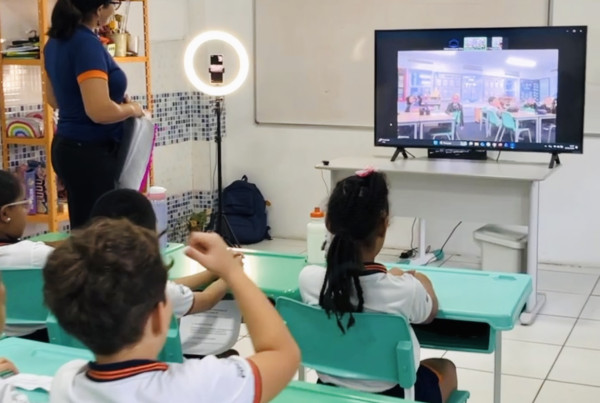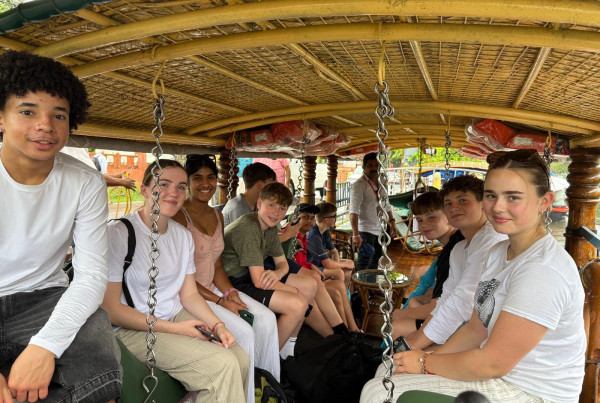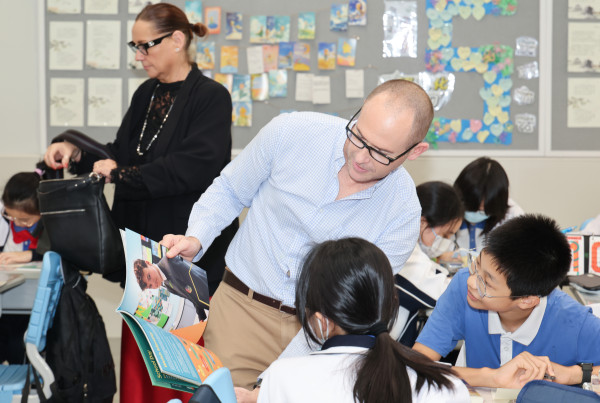The following article comes from Rob Ford, CEO and Director of Heritage International School Moldova.
There are a lot of conversations in education. Probably too many. All trying to look around corners and see what comes next, mostly out of fear that no one really knows what will come next. That is the problem with the zeitgeist of the 2020s especially when we are living through so many existentialist moments, all packed into one decade, that is still only halfway through.
All the good, reliable cliches come out including “education will be reimagined”, “we have to be comfortable with being uncomfortable” and my current favourite as we approach World Teachers’ Day at the start of October, “Teachers will be replaced by AI”. Just to add a bit more dystopia to the 2020s as if we haven’t had enough.
And then all of a sudden, in the last week of September, one of those weeks happened, that frequently do in education, when you realise that the answers are there, that energies do not need to be wasted on the wrong issues and people, and you find the shift in mood to surge forward with your mission as a school leader.
The catalyst for this “game changing” week came with the visit of two long-standing international education colleagues and friends, Mrs. Colette Cotton and Mr. John Rolfe. Colette has been working longer in schools than she cares to remember and has partnered through Etwinning & GSA, Heritage Primary School for a number of years. Colette epitomises the very best of a teacher in her dedication to the classroom, students and her colleagues, with her wisdom and experience to share. She also brings her passion for international education and how to develop an open mindset as well as making global citizens proud of who they are and where they come from.
John Rolfe is one of the best known & respected figures in UK education and globally, through his many years supporting schools and the incredible work he continues for schools at the Global School Alliance.
John is also a governor of Heritage, a proud school member of the Global School Alliance, and was awarded his MBE by Her Late Majesty, Queen Elizabeth II, for his services to international education.

We had both these incredible people in our school and to work in our national education community for a week. What I realise now, reflecting back upon this remarkable week with them, is the opportunities it provided to see our context as a GSA partner school, and what we are doing in our schools in Moldova. It started the same way as any of our honoured guests, a traditional bread and salt welcome in our school, students standing proudly in their national dress and linking who they are to the two international visitors.
When we agonise about identity in a global society we need to remember that some of the most powerful and important work around international education is allowing students from Merseyside to Mumbai, via Moldova, to see who they are and link it to the World they also share in their common humanity. No false dichotomies and narrow nationalism here that is unfortunately all too prevalent and amplified in the 2020s and especially in the crucial elections taking place in many countries in 2024.

One of the central tenets of the Heritage mission is the impact and importance of working with the national education community, responding to the educational challenges we all face, across the sector, whatever the label. It was an honour to be welcomed into both Gheorghe Asachi High School in the centre of Chisinau, as well as Alexandru Donici High School in Peresecina, outside of the capital and a more rural school. These schools and others, seeing the benefits and advantages of partnerships through the GSA.
In all these schools, staff and students demonstrated not only the brilliant Moldovan skills of multi-linguism and communication, but also their reflections of education and the optimism they wanted for their futures. We also talked at length about the problems that the globe faces collectively such as climate change, inequality and the war still continuing over our border and adding to the instability of the region.
We think about our friends and colleagues daily in our COBIS & GSA sister school, BISU, what they must think looking at the question of what comes next?
John and Colette also met with the Minister of Education, Mr. Dan Perciun, and Her Excellency, Fern Horine, UK Ambassador to Moldova. Both incredible supporters of education and young people in Moldova. John spoke at length about the work of the GSA and these partnerships support countries like Moldova, through unique learning opportunities, professional development of educators and a network to bring the global classroom together.
What I feel privileged about here is the fact that key respected figures in our society, like a Minister and an Ambassador, will engage with teachers, students, educators frequently, and make decisions about education from a position of knowledge and strength because of these and similar conversations in the national educational dialogue.
These are the moments I like such conversations about education and the question of “What comes next?” starts to get better answers.
I also like the moments to reflect, especially in this role and especially when I remember how much I love the study of history and how much I miss teaching history. The complex history of Moldova, this land between the Prut and Nistru, was discussed as we had a spontaneous coffee morning conversation outside the National History Museum with its director.
My friend and colleague, GSA ambassador, Tatiana Popa, illustrated how intertwined history and the present are in Moldova, with key elections later this month, when she pointed to her father-in-law’s signature, as a then MP, who signed the declaration of independence as Moldova formally left the USSR.
I have had many visits to Old Orhei, savouring that stunning jewel of Moldova’s spiritualism, history and geography, but it was a particularly tranquil and meaningful visit to show Colette and John a place that should really be a UNESCO site and funding given to secure and support it for future generations to come.

I am not sure if it was sitting in the warm late September sunshine watching the IGCSE graduation ceremony, with John as our guest of honour, celebrating our brilliant young people with their families, feeling very hopeful and optimistic, listening to the powerful words of our valedictory students or our teachers, or maybe the flow of conversations at the official dinner with school leaders and Board to honour John and Colette, that made me feel that we can find the answers to what comes next.
So what comes next? More of this would be useful, would be helpful, would help change the direction for the better. For those who like conversations about education, I would definitely recommend those conversations, the power of GSA partnerships, that both come from and are in education.
Literally immerse yourself regularly in schools and with the thoughts, views, hopes and dreams of children and those that work in education daily. I have come to the conclusion this autumn that we are where we are, we have what we have and we can do what we can. It may just be enough to find us the answers and way forward in the rest of the decade to what comes next, through the power of our partnerships.

















